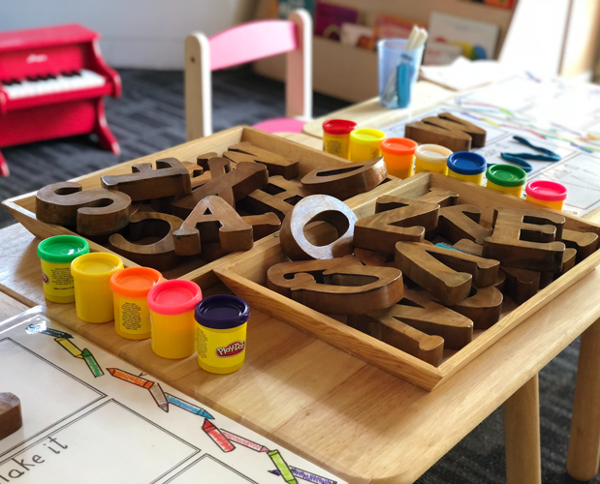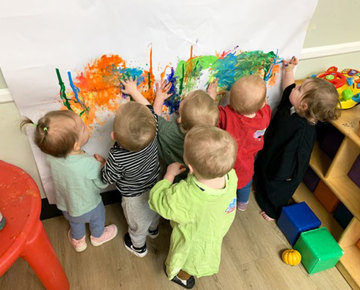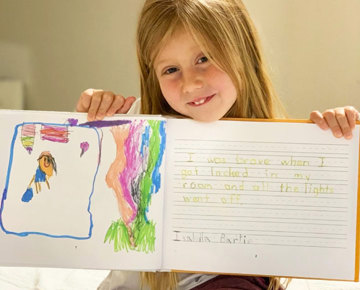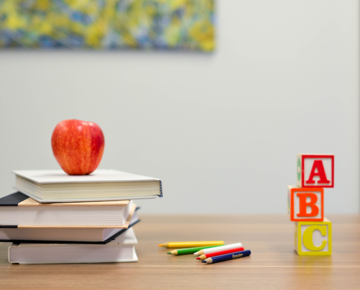New Year, New Focus | A Quality Campaign | Environment

New Year, New Focus – A Quality Campaign for 2023
For the next few months of our Quality Campaign for 2023: New Year, New Focus, we will dive deeper into each of the five areas of concentration. This month, we will study Environment more intentionally.
Academic Posters Don’t Teach | Encouraging Little Learners to Engage with Their Learning Space
Let’s be frank: academic posters don’t teach. Those shapes, colors, letters, numbers, and maps that hang on the walls of early childhood classrooms may seem cute, may even make classrooms feel more like “school;” but chances are they are not helping children learn.

Why, you ask?
One reason is called selective filtering. This is actually a pretty amazing process in the brain that little learners AND big learners share: every brain filters stimuli selectively. We constantly receive input from four or five senses at once. And our brain tends to ignore much of the visual information it takes in to allow focus on other important things.
Posters on the wall fade into the background very quickly, in favor of new sights, sounds, smells, and sensory touching that occurs each day. Little brains quickly realize posters should be filtered out to focus elsewhere. And if little brains don’t filter out these recurring visual stimuli with selective filtering, the posters can contribute to overstimulation.
Overstimulation happens when our brains are trying to figure out what to filter but can’t decide what stimuli is most important.

In little learners, overstimulation often leads to challenges attending to tasks and behavior issues. Don’t forget: children are learning to decode symbols on a continuum that is quite long and varied.
The likelihood is that many of the symbols – whether they are shapes, letters, numbers, or even worse, a mixture of all three – will be difficult for many children in the classroom to decipher. And when kiddos are presented with too much stimulus, processing may slow down or even stop completely.
So what can you do instead?
1. Make posters and other wall displays meaningful.
Provide opportunities for children to engage with these displays every day, so that they are less likely to fade into the background.
For example, place a mirror near the classroom door and when children arrive, invite them to take a look at the expression on their face. Describe it in your own words – “I see the corners of your mouth turned up to the sky like a smile. Are you happy this morning?” And then invite the kiddo to find a face on an Emotions poster that looks like theirs.
2. Use graphs and charts.
Graphs and charts take information from children and organize it in a visual way. This makes the graph and chart important. Furthermore, graphs and charts can be enhanced many times with new daily information, new pictures, and new words.
This dynamic engagement encourages the little brain to continue processing the new stimuli in relation to the older data.
One example is a word wall: an ever-changing display where children can add words they discover during reading and writing. The key is adding words that children suggest often – at least once a week!
3. Place children’s art down low, at eye-level.
Children LOVE displaying their art on the wall. This is a great opportunity to use your wall space for something that will give your child a sense of ownership and pride.
Remember to switch out the art often. Date the art so you are reminded to add new masterpieces all month long.
4. Create an interactive poster to go along with each new study.
An interactive poster is one that children were involved in making.
Families can get involved, too: send home a large piece of paper or poster board and invite families to make a display showcasing something they want to know about an upcoming study, or something they have learned during a recent study.
Young classrooms without a study of focus can make family trees, go on a shape hunt and take photos to illustrate, look for different colors and textures outside and draw them, showcase letters on clothing, billboards, book covers, and more.
By Jaime Rechkemmer, Vice President of Education


